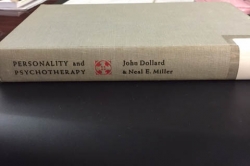McGraw-Hill publications in psychology Personality and psychotherapy; an analysis in terms of learning, thinking, and culture

Book Stores
Type
Book
Authors
Category
Publication Year
1950
Publisher
McGraw-Hill, United States
Pages
488
Subject
Psychology. Psychotherapy.
Series Name
Description
pt. I. Orientation: Main points. What is a neurosis? -- pt. II. Basic principles of learning: Four fundamentals of learning. Significant details of the learning process. Learned drive and learned reinforcement -- pt. III. The normal use of the mind in solving emotional problems: Introduction to higher mental processes: effect on transfer and discrimination. The role of words and sentences in arousing drives, mediating rewards, and producing foresight. Reasoning and planning. Social training in the use of higher mental processes -- pt. IV. How neurosis is learned: Social conditions for the learning of unconscious conflicts. How symptoms are learned. The unconscious: how repression is learned. The interactions among the basic factors involved in neurosis -- pt. V. The new conditions of therapeutic learning: Preview of main factors in therapy. Selecting patients who can learn. Free association--permissiveness and the compulsion to utter. Transference: generalized responses in the therapeutic situation. Labeling: teaching the patient to think about new topics. Teaching the patient to discriminate: role of past and present. Gains from restoring the higher mental processes -- pt. VI. Conflict: Why conflicts and misery can be relieved only in real life. The dynamics of conflict: their implications for therapy. A hypothesis concerning alcohol, barbiturates, and lobotomy -- pt. VII. Special aspects of therapy: Ways of getting rid of symptoms. Techniques of therapeutic intervention. Keeping the patient's motivation to continue stronger than that to quit. Requirements of the therapist as a special kind of teacher. How therapy can go wrong -- pt. VIII. Two applications to normal living: Self-study. Suppressing troublesome thoughts to get freedom for creative thinking.
Biblio Notes
Includes bibliographical references (pages 461-469).
Number of Copies
1
| Library | Accession No | Call No | Copy No | Edition | Location | Availability |
|---|---|---|---|---|---|---|
| Main | 51 | BF67 .D665p | 1 | Yes |




